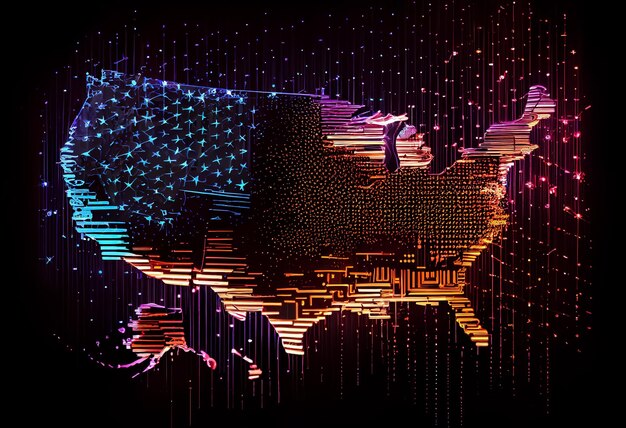US Tech Giants Dominating Blockchain: Top Applications Unveiled

US tech companies spearhead blockchain development, innovating in finance, healthcare, supply chain, and digital identity, driving adoption through strategic investments and cutting-edge research.
The landscape of blockchain technology is rapidly evolving, and US tech companies lead the way in blockchain development: what are the most promising applications? From revolutionizing financial systems to enhancing data security, these companies are at the forefront of innovation.
Blockchain Innovation in the US: A Tech Giant’s Playground
The United States has emerged as a global hub for blockchain innovation, largely driven by its tech giants. These companies are not just exploring the potential of blockchain but are actively implementing it across various sectors. Their substantial investments in research and development, coupled with strategic partnerships, are accelerating the adoption of blockchain technology.
Understanding the scope of their involvement requires a closer look at specific applications and the impact these innovations are having on industries worldwide. From securing supply chains to transforming digital transactions, the possibilities seem limitless.
The Role of Big Tech
Companies like Microsoft, IBM, and Amazon are pioneering blockchain solutions because of their resources and the vision to see it changing things. They’re building platforms and tools that make it easier for other businesses to integrate blockchain into their businesses.
- Microsoft’s Azure Blockchain: Offers a development platform, empowering companies to innovate on pre-existing environments.
- IBM’s Blockchain Solutions: Provides customized blockchain networks for enterprise-level implementations, primarily in supply chain and finance.
- Amazon’s AWS Blockchain: Delivers scalable blockchain services focusing on ease of use and broad accessibility for developers.
These corporations facilitate experimentation and the real-world use of blockchain, thereby enabling a whole new era of technology.
In conclusion, the US tech sector is vital for the acceptance and development of blockchain technologies, providing the required experience and finances to push the envelope.
Financial Revolution: Blockchain Transforms Banking and Payments
One of the most promising applications of blockchain technology lies in the financial sector. US tech companies are leveraging blockchain to create more efficient, secure, and transparent banking and payment systems. This innovation aims to tackle traditional pain points such as high transaction costs and lengthy processing times.
Blockchain’s decentralized nature offers a refreshing perspective, potentially reshaping core banking processes. This ranges from how digital currencies are handled to how international payments can be expedited.

Streamlining Transactions Securely
Blockchain-based systems offer enhanced security and efficiency for financial transactions. For example, companies are developing blockchain solutions that can streamline cross-border payments, reducing both costs and processing times. Smart contracts, self-executing agreements written into the blockchain, automate processes and reduce the need for intermediaries.
These advancements aim to simplify and secure how money moves worldwide, making things easier and cheaper for both consumers and businesses.
- Reduced Transaction Fees: By eliminating intermediaries, blockchain slashes the expenses of operations.
- Faster Processing Times: Transactions may be verified and completed a lot faster than with standard methods.
- Improved Security: With cryptography and dispensed ledgers, blockchain makes attacks and frauds difficult.
These technologies signal a transition toward a more user-centered, effective, and accountable financial architecture.
In summary, blockchain holds great potential for overhauling financing with higher performance, protection, and openness. These modifications make banking better for everybody.
Healthcare’s Digital Ledger: Securing Patient Data with Blockchain
The healthcare industry is increasingly turning to blockchain technology to enhance data security and interoperability. US tech companies are developing blockchain solutions that enable secure sharing of patient records and streamline administrative processes. This is particularly important in an era where data breaches and privacy concerns are paramount.
The move to blockchain in healthcare comes at an important point: securing sensitive data and streamlining information exchange. Tech firms are looking at ways blockchain can offer protection, openness, and efficiency.
A New Era of Data Security
Blockchain’s encryption and decentralization make it attractive for healthcare data security, addressing the vulnerabilities of traditional systems. Because of the tamper-proof aspect of blockchain, healthcare organizations are able to trust the integrity and accuracy of patient information.

- Enhanced Interoperability: Blockchain enables disparate healthcare systems to share and synchronize data seamlessly.
- Improved Data Integrity: The immutable nature of blockchain ensures that patient records remain unaltered and accurate.
- Greater Patient Control: Blockchain-based solutions can give patients more control over their health data, allowing them to grant or revoke access as needed.
The healthcare sector’s outlook is poised to bring forth an innovative era, defined by patient data that is safe and seamlessly accessible.
In sum, blockchain is a key element in moving towards a more secure and patient-focused healthcare system, driven forward by the innovation of large technology corporations across the United States.
Supply Chain Transparency: Tracking Goods from Origin to Consumer
Supply chain management is another area where blockchain is making significant inroads. US tech companies are developing blockchain platforms that track products from their origin to the end consumer, providing unprecedented transparency and accountability. This is particularly valuable for industries dealing with complex supply chains, such as food, pharmaceuticals, and luxury goods.
With an ever-increasing need to verify product origin and reduce fraud, blockchain applications emerge as the best solution. Blockchain can trace products along any given supply chain, assuring consumers that they know where products come from and guaranteeing product integrity.
Verifying Authenticity and Provenance
Using blockchain-based systems reduces the chance of counterfeiting and fraud. Providing a permanent record of each product’s journey from beginning to end, guarantees authenticity. It also promotes accountability across the supply network, offering customers and businesses the assurance that products are genuine.
These technologies also help supply chain partners track goods securely in real-time, enhancing inventory management and minimizing inefficiencies.
- Real-Time Tracking: Allowing businesses to trace products in real-time via the supply chain, which increases accountability and efficiency.
- Combating Counterfeiting: By verifying the provenance of products helps reduce counterfeit products and protect customers.
- Enhancing Efficiency: Automating and streamlining the movement of goods from origin to sales by using systems based on blockchain.
By utilizing the capabilities of digital ledgers, companies are improving how the manufacturing and transfer of goods happens, which is a win for all.
In summary, US tech firms are innovating rapidly, using technology to bring transparency, protection and productivity to different supply chains worldwide.
Digital Identity: Secure and Self-Sovereign with Blockchain
The concept of digital identity is being revolutionized by blockchain technology, offering individuals more control over their personal data. US tech companies are developing blockchain-based systems that enable secure and self-sovereign digital identities. This means individuals can manage their credentials and selectively share information without relying on centralized authorities.
In today’s world, people face increasing digital identity theft and limited power over private data, which fuels the need for blockchain-secured systems. This blockchain offers the hope of people taking back control of what information they release to whom.
Empowering Individuals
Self-sovereign identity solutions give individuals the ability to control their personal data. Users determine how their identifying information is used and who has access to it. This method reduces the danger of personal data being misused and gives people better peace of mind when interacting online.
- User Control: Individuals have complete control over their digital identities, choosing who they share information with.
- Data Security: Decentralized storage and encryption protect sensitive data from unauthorized access.
- Interoperability: Blockchain-based identities can be used across different platforms and services, simplifying online interactions.
In today’s digital era, blockchain provides the instruments to safeguard identity and strengthen security for everyone.
To sum up, the evolution of blockchain technology within digital identification promises to provide individuals with better security, more transparency, and better management over their sensitive data.
Future Trends: What’s Next in Blockchain Development?
Looking ahead, several exciting trends are shaping the future of blockchain development. US tech companies are investing in research and development to explore new applications and enhance existing ones. These trends include scalability solutions, interoperability protocols, and decentralized finance (DeFi) platforms.
Advancements in technology, along with the ongoing work of US tech companies, will impact blockchain’s future. Work is currently underway exploring how these new technologies can be more adaptive, integrated, and efficient.
Emerging Technologies
The future of blockchain development involves several key areas. Scalability solutions, such as layer-two protocols, aim to improve transaction throughput and reduce costs. Interoperability protocols enable different blockchain networks to communicate and exchange data, fostering a more connected ecosystem.
DeFi platforms are creating new financial applications using blockchain technology, providing access to lending, borrowing, and trading services without traditional intermediaries.
- Scalability Solutions: Advances such as layer-0, layer-1, and layer-2 protocols, allow high volume transactions and low expenses.
- Interoperability Protocols: They allow different blockchains to speak to each other, enhancing synergy, and also interoperability.
- Decentralized Finance (DeFi): It has the possibility to democratize finance by developing solutions that are much more accessible and innovative.
These innovations promise to create a more effective, versatile, and accessible blockchain ecosystem.
Ultimately, US tech firms remain actively working to mold the trajectory of blockchain technology through exploration, application, and dedication.
| Key Point | Brief Description |
|---|---|
| 💰 Blockchain Finance | Blockchain improves transaction speed and reduces costs in banking. |
| ⚕️ Healthcare Security | Secures patient data, enhancing privacy and data integrity using blockchain. |
| 📦 Supply Chain Tracking | Offers detailed tracking of products, boosting transparency. |
| 🔑 Digital Identity | Provides control over personal data, improving security online. |
Frequently Asked Questions
▼
US tech companies are at the forefront. They spearhead innovation, investments, and adoption across key industries with blockchain solutions. These corporations also develop blockchain-based platforms.
▼
Blockchain improves transaction security and cuts costs, especially abroad. Smart contracts and decentralization create more efficient systems. Blockchain decreases the necessity of intermediaries for transparent and secure payment.
▼
Blockchain secures patient information. The blockchain makes sure the records are interoperable, secure, and unaltered. It also allows patients to control who has access to what, strengthening privacy.
▼
Blockchain tracks products, providing end-to-end insight and validating their authenticity. Also, goods being moved can be tracked to maintain efficiencies and reduce bogus items.
▼
Future trends include scalable solutions, interoperability protocols, and DeFi. These enable higher efficiency and integration via the distributed ledger tech. Those trends are also making the blockchain more accessible.
Conclusion
In conclusion, the involvement of US tech firms in blockchain development has paved the way for various applications across finance, healthcare, supply chain, and digital identity. As these companies continue to innovate and invest in blockchain technology, we can anticipate further advancements and broader adoption, turning blockchain into a foundational technology for the future.





